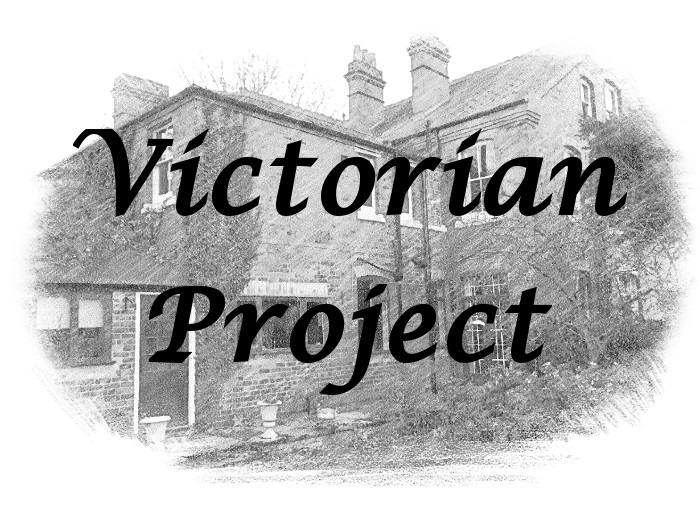If you have bought an old house you will often find the ceilings to be papered and there are a number of reasons for this. The style of the paper may look out of date and you are keen to replace it with a painted surface or a more modern paper style. If you are in this position and considering what to do with a wallpapered ceiling then take a moment to read this article before ripping it down. You may just change your mind.
What is the Victorian Project all about? Find out here.
Why Would You Wallpaper A Ceiling?
If you buy a Victorian House it is highly likely that most rooms will have papered ceilings. The main reason for this is that they are usually plastered using lime with a rough finish. Plus, old ceilings are notorious for cracking. A think Anaglypta style paper masks these issues giving a more pleasing look. Papering everything was also just the way that Victorians did things and rarely would you see a straight painted surface. Most people renovating a Victorian house want to modernise it somewhat and removing wallpaper from ceiling spaces in favour of paint is popular but be warned… [See also: Remove Stubborn Wallpaper – Stripping Back]
Issues Removing Wallpaper From Ceiling Spaces
The biggest problem with removing wallpaper from ceilings is that you don’t know what lurks beneath. When we were undertaking our living room renovation the ceiling paper was extremely dated. We quite quickly set about pulling it down. Beneath the paper was indeed lime plaster and lime is nowhere near as solid and firmly attached as modern plasters. What we found is that loose bits of plaster were coming away with the paper leaving the bare ceiling looking rather unsightly. The ceiling paper had concealed some huge cracks which you just wouldn’t know were there with the paper up. [See also: Should Lime Be Used for Victorian Houses? Lime vs Gypsum Plaster]

When all of the paper was removed the ceiling resembled something like the surface of the moon. In this state it could not be painted and if we were to put fresh modern paper up it would now have to be something very thick and patterned to hide the mess we had created. When all of the paper was down we kind of wished we had just painted over the top of it. [See also: Repairing Lime Plaster Walls – Hiding The Cracks]
What To Do With A Wallpapered Ceiling?
If you are considering what to do with your wallpapered ceiling then my advice is to first of all find out what is beneath it. Find a loose corner somewhere on the paper and pull a bit away to reveal the plaster. If it is gypsum plaster it should come down quite easily but if it is lime then have a little rethink. If you are unsure what they look like the image below shows the two side by side. Gypsum plaster may still be cracked in places so still consider if it is absolutely necessary to remove it. [See also: Fix Damp in Victorian Houses and the Common Causes]

If it is lime then it is unlikely that you will get a paintable surface. You have three real options. [See also: Plaster, Putty & Paint – The Living Room Walls]
Papered Ceiling Renovation Options
- You can remove the ceiling paper and replace it with something a little more modern however you will need to spend a mass of time filling the craters and cracks and you will need to use a thick patterned paper. This is the option that we took in our living room. We have fresh, more modern paper but in some places you can still make out the damage we did to the lime surface.
- You have it re-plastered. This option will give you a paintable smooth surface but will come at extra cost. We considered over boarding the existing ceiling prior to plastering. Unfortunately however, we couldn’t do this due to coving and a grand old ceiling rose to contend with. If you do choose to overboard it then don’t bother taking the old paper down, you can go over the top.
- The safest, easiest and cheapest option is to decide whether the old paper is really that bad. Can it be transformed using just a lick of paint? If you take this option you will save yourself time and money and be sure to retain a nice even ceiling surface. After doing our living room this is the option we would recommend.
Removing Wallpaper From Ceiling
If you really must remove it then take your time. Removing wall paper from ceiling areas can be tricky as using a standard wallpaper stripper is a pain. As you need to hold it up above your head you would be constantly showered in hot water droplets and it isn’t easy to work with. My suggestion is to fill a bucket with warm water and give the entire ceiling space a soak. Then give it 15 minutes or so to absorb. Next, refill your bucket, again with warm water, soak a small space and scrape the paper off. Continue to do this until all is removed. [See also: Victorian Roof Repairs – Starting Point for any Renovation]
If you have lime plaster beneath the paper then the more time you take over the removal will reduce the damage to the ceiling and the time needed to level it up afterwards. This was really our issue. We had a large ceiling to cover and at times we were too quick & forceful in bringing the paper down. This resulted in hours of sanding, smoothing and filling to get the ceiling back to the position where it could be re-done with new paper. In hindsight we should have left the paper up. [See also: Open Up A Fireplace & Log Burner Installation]
Papering & Painting The Ceiling
If you are thinking of papering a ceiling yourself I would ensure that you are competent with walls first. Working on a ceiling follows the same principles as a wall but with added complexity of doing it all above your head and on ladders. We have since papered some ceilings but in our living room discussed above we hired in someone to do the job. If you have already prepped the surface sufficiently a decent decorator can paper most ceilings for you in a day. [See also: Breathable Paint For Lime Plaster – What Are The Options?]
When it comes to painting the ceiling there are really three things to do. You will see complex guides on the correct way to paint a ceiling but these are often overkill.
- Divide the ceiling space into quarters completing each quarter individually before moving onto the next.
- Try to roll towards natural light such as a window.
- Use multiple coats to ensure that no areas are missed and use a mist coat if painting bare plaster.

What To Do With A Wallpapered Ceiling? – Roundup
If you take down ceiling paper in old houses then be warned! You may create yourself a lot of work or expense. The paper may have sat undisturbed for decades on top of lime plaster. If it has then don’t expect to just take it down and paint. You will likely have to have it plastered or spend significant time patching up & re-papering. Prior to removal, establish what type of plaster you have and ask yourself if the current ceiling paper really has to go. Would a fresh lick of paint bring it back to life and fit in with your design plans? If the answer is ‘Yes then you will really save yourself a headache. In our living room we learned the hard way and really wish we hadn’t taken the paper down. [See also: Earthborn Clay Paint Review – Breathable & Eco Friendly]


